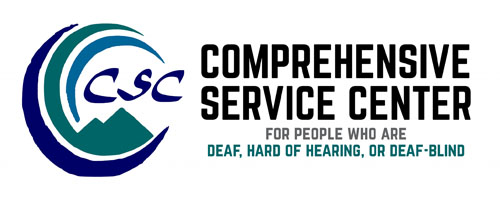Resources for Families & Professionals
Online Resources
American Society for Deaf Children
The American Society For Deaf Children’s resource page offers tools for families who’d like to help their child learn ASL. One website, BabySignLanguage.com, has a great list of flashcards with usage tips for successful memorization. The page also includes an ASL rhymes video, a list of recommended apps to help children and adults learn ASL, and a link to MyALSTech, which offers a large online ASL dictionary with conceptual graphics.
Children with Special Health Needs Branch (CSHNB)
Children with Special Health Needs Branch (CSHNB) works to ensure that all children and youth with special health care needs will reach optimal health, growth, and development, by improving access to a coordinated system of family-centered health care services and improving outcomes, through systems development, assessment, assurance, education, collaborative partnerships, and family support.
Early Intervention Section 0-3
The Early Intervention Section (EIS), otherwise known as the 0-3 Program, of the State Department of Health is a program that provides developmental services for any eligible child from birth to three years of age in five areas: physical, cognitive, communication, social or emotional and adaptive. Services are available on all islands and there is no cost to families.
Hawaii Hands & Voices
Hands & Voices is dedicated to supporting families with children who are Deaf or Hard of Hearing without a bias towards communication modes or methodology. We’re a parent-driven, non-profit organization providing families with the resources, networks, and information they need to improve communication access and educational outcomes for their children. Our outreach activities, parent/professional collaboration, and advocacy efforts are focused on enabling Deaf and Hard-of-Hearing children to reach their highest potential.
Hawai’i Keiki Information Services System (H-KISS)
The Hawai’i Keiki Information Services System (H-KISS) is a free information and referral service of the Early Intervention Section. A care coordinator can help answer questions and get your child evaluated for developmental delays or other special needs, get needed services (like speech therapy and physical therapy), and link to other parents and services (such as child care, family support, respite, and community services).
Hawaii State Resource Guide for Families of Children with Hearing Loss
This resource guide is for families with children who have recently been diagnosed with hearing loss. We hope that it will give you information and a variety of local resources. Children with hearing loss may have challenges in their learning, language, and social development. Early identification of hearing loss helps a child reach their fullest potential. Parent involvement also plays a big role in helping a child grow. This resource guide aims to help parents learn about communication opportunities, how hearing loss affects language development, available technologies, and other topics related to children who are deaf and hard-of-hearing.
National Center for Hearing Assessment and Management (NCHAM)
NCHAM serves as the National Technical Resource Center for the implementation and improvement of comprehensive and effective Early Hearing Detection and Intervention (EHDI) systems. As a multidisciplinary Center, their goal is to ensure that all infants and toddlers with hearing loss are identified as early as possible and provided with timely and appropriate audiological, educational, and medical intervention.
Public Health Nursing Branch (PHNB)
Public Health Nursing Branch (PHNB) administers the public health nursing services statewide. The staff of PHNB is made up of Public Health Nurses, who are Registered Nurses, Licensed Practical Nurses, Para-medical Assistants, and Health Aids in the public schools. Public Health Nursing services are focused on public health issues which include care coordination services for infants and toddlers for EIS and facilitate access to services for special needs populations with medical/health and their caregivers.
Special Parent Information Network (SPIN)
The Special Parent Information Network (SPIN) is a parent to parent organization in Hawai’i that provides information, support and referral to parents of children and young adults with disabilities and the professionals who serve them. SPIN tries to keep families of a child with a disability linked to important information through its annual conference, quarterly newsletter, legislative updates, Special Education Advisory Council, fact sheets and parent guidebook.
The Sibling Support Project
The Sibling Support Project is a national effort dedicated to the life-long concerns of brothers and sisters of people who have special health, developmental, or mental health concerns.
Women, Infants, and Children (WIC)
The Special Supplemental Nutrition Program for Women, Infants and Children (WIC), is a federally funded program which provides Hawai’i residents with nourishing supplemental foods, nutrition education, breastfeeding promotion and health and social service referrals. The participants of WIC are either pregnant, breastfeeding, or postpartum women, and infants and children under age five who meet income guidelines and have a medical or nutritional risk.
WonderBaby
Wonderbaby.org, a project funded by Perkins School for the Blind, is dedicated to helping parents of young children with visual impairments as well as children with multiple disabilities. It has a database of articles written by parents who want to share with others what they’ve learned about playing with and teaching a blind child, as well as links to meaningful resources and ways to connect with other families. Additional resources such as Dots for Tots, Seedlings and NBP for free/cheap Braille books can be found on the Wonderbaby.org website.
